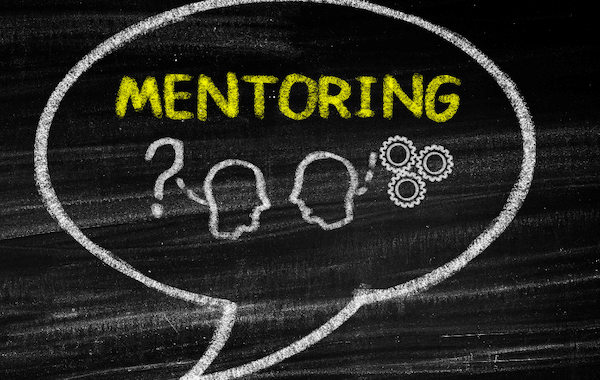Do you really need a mentor? As you progress through your career, you might find yourself pondering the possibility of learning through a mentor, particularly when you feel like you’re stunted in your growth, unsure of what to do, or just stuck in a rut.
It’s sad to think that despite the number of people seeing the value of a mentor, only 37% have one. There are plenty of reasons behind this so it’s a key factor to consider. But if you’re hoping to get out of the proverbial “career parking lot,” working with a mentor can be a big help – they can help you to understand your career pathway options and next steps.
If you are ready to start your new journey as a mentee, there are a few things you need to know so you can make the relationship work. We’ve shared a previous article on the essential qualities that make a mentee stand out and succeed in a mentorship relationship. But in this mentorship etiquette guide, we want to point out some dos and don’ts that can help make your mentor-mentee relationship successful. Since everyone has different ways to communicate, we’ve listed some of the best tips to help with your mentorship journey.
Here are some of the mentorship dos and don’ts you need to know as a mentee:
Mentorship Etiquette: Dos
⦁ Respect your mentor’s time. Always be on time for your mentorship session and be prepared.
⦁ Establish norms upon your first meeting. The first meeting you have with your mentor should be to talk about your goals, responsibilities, expectations and boundaries. Agree on sensitive topics you wish to avoid talking about. At Brancher, we encourage you to complete a Mentoring Agreement during your first meeting.
⦁ Encourage feedback. Be open to receiving honest feedback and constructive criticism so you can manage your weaknesses and leverage your strengths.
⦁ Encourage independent decision-making. You are not expected to follow every suggestion your mentor makes. At the same time, mentors should not expect mentees to become clones of themselves. You need to know how to critically evaluate guidance and make your own decisions.
⦁ Work towards your own goals. Work towards achieving your own goals instead of your mentor’s goals for you. This requires some reflection and “self work” in between mentoring sessions.
⦁ Be grateful for the assistance. Most mentor-mentee relationships are unpaid. The best way you can show appreciation is by a simple thank you.
⦁ Maintain a professional relationship. Act professionally at all times to maintain a respectful relationship between you and your mentor.
⦁ Stay in touch with your mentor. Once the mentoring program comes to an end, you can keep your lines of communication open so you can build a lasting relationship with your mentor. Ensure to revisit the expectations and boundaries conversation to ensure you understand what frequency of communication your mentor is comfortable with, post the formal relationship.
Mentorship Etiquette: Don’ts
- Assume your time is more valuable. Your mentor’s schedule is as important as yours, ensure you are on time for meetings and put distractions (e.g. phone) away when meeting.
- Neglect to establish ground rules. Establish ground rules from the start of your mentor-mentee relationship. Have a difficult or awkward conversation early to avoid any confusion or unaddressed assumptions.
- Wait for feedback. Mentorship is a chance for you to practice your communication skills – ask for feedback from your mentor and lean into this to further improve.
- Make it personal. It’s normal to talk about things outside of work, that’s how we build relationships and trust. However, keep your mentor-mentee relationship professional by respecting each other’s boundaries.
- End things badly. Try to end each mentoring session in an amicable manner so you can leave a positive experience with your mentor. You might also want to send a follow up note documenting any agreed actions or an agenda for the next meeting.

Science-based Matching
Finding a good mentor is key to a successful mentoring relationship. But with hundreds of individuals in your organisation, it can be hard to manually match mentors with potential mentees. The best way you can match employees is through Brancher’s science-based matching algorithm. Brancher is the only mentoring software worldwide to have an AI chemistry matching
algorithm that takes personality and values into account delivering over 90% satisfaction.
Book a demo with us today to see how Brancher’s mentoring software worked with organisations like the Queensland Government, Fletcher Building, and Super Retail Group.
Resources:
- Comaford, Christine. (2019, July 3). New Study 76% of People Think Mentors Are Important, But Only 37% Have One. Forbes. https://www.forbes.com/sites/christinecomaford/2019/07/03/new-study-76-of-people-think-mentors-are-important-but-only-37-have-one/?sh=21cdc56b4329
- Reeves, Matthew. (2023, October 6). 6 Benefits of Mentoring in the 2023 Workplace. Forbes. https://www.forbes.com/sites/forbeshumanresourcescouncil/2023/10/06/6-benefits-of-mentoring-in-the-2023-workplace/?sh=e3dc07a20d70
- Cantalupo, Gracey. (2022, May 19). Does Mentoring Still Matter For Fortune 500 Companies? Forbes. https://www.forbes.com/sites/forbescommunicationscouncil/2022/05/19/does-mentoring-still-matter-for-fortune-500-companies/?sh=9ada2875d8c7

